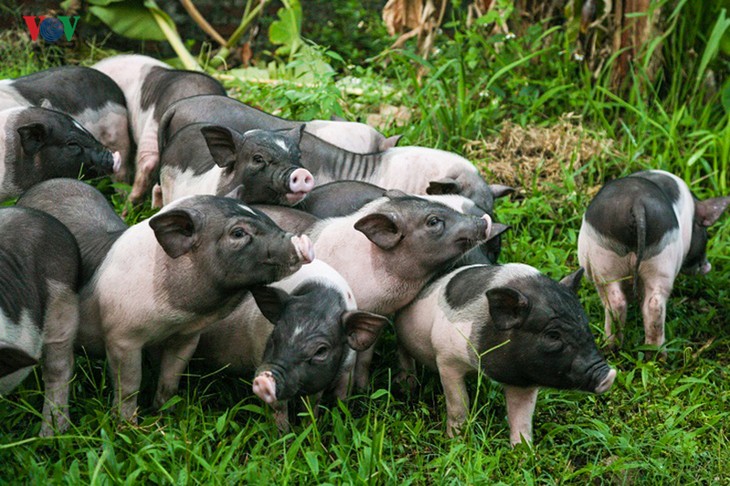(VOVWORLD) - The Mong Cai pig is a rare indigenous porcine breed in the northern province of Quang Ninh. It is easy to raise, strongly resistant to diseases, has a high fertility rate and quality meat. Since the outbreaks of African swine fever were reported in Vietnam early this year, Quang Ninh’s agricultural sector and people have taken a series of urgent measures to conserve this pig breed.
|
 Mong Cai pigs. Mong Cai pigs.
|
African swine fever has been plaguing Quang Ninh over recent months. After the epidemic ravaged several countries late last year, Quang Ninh authorities have deployed preventive measures to preserve the Mong Cai pig.
Dang Quoc Bao, Director of the Quang Ninh Domestic Animal Breed Company, said: “Our herd of hundreds of Mong Cai pig breeds was hit by African swine fever though we have used all possible measures to protect them. Nobody can be sure when the epidemic will end.”
According to the provincial husbandry and veterinary agency, Quang Ninh currently has 27,000 Mong Cai pigs, accounting for 81% of the province’s total. Many solutions have been discussed including sending Mong Cai pigs to islands to avoid African swine fever. So far, 26 pigs have been transported to The Vang island in Van Don district by Thien Thuan Tuong Mining Company, one of five Mong Cai pig raising facilities.
Tran Hoa, the company’s director, said: “The pigs are expected to breed in August or September. The island is large and uninhabited. We have strictly followed isolation and feeding regulations.”
The provincial Department of Agriculture and Rural Development has planned to preserve the Mong Cai pig breed by using artificial insemination. Six hundred doses of sperm and 1,000 germ cells will be stored until the African swine fever ends.
Dr. Phan Le Son from the National Institute of Animal Sciences explains: “We have to prepare for the worst scenario. By freezing the pigs’ sperms and germ cells, we’ll be able to restore the Mong Cai pig herd in one or two years even if all the existing pigs are infected.”